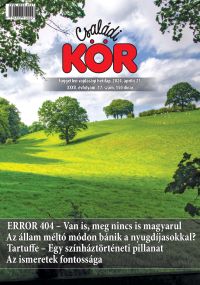Preceding Events
2016
January–February: Magyar Szó (Hungarian Word) [the only Hungarian-language daily newspaper in Serbia, where most of our editors honed their skills] publishes a couple of plagiarized articles and refuses to publish an insider opinion piece aimed at protecting the reputation of the paper.
April: On the last day before “campaign silence” [an arcane rule whereby, in some European countries, including Serbia, it is illegal to publish any political content related to the upcoming election] of the 2016 Serbian parliamentary elections, Magyar Szó runs an unusually long, full-page opinion piece by an infrequently contributing graphic artist who, in harsh terms, disparaged all real and imagined opponents and critics of the ethnic Hungarian party, which was, and planned to be, in coalition with the ruling Serbian party of Prime Minister Aleksandar Vučić, including the paper’s own Washington correspondent. The paper declined to publish a rebuttal.
May: Magyar Szó fires its former Editor-in-Chief, then working as its marketing expert, on fabricated grounds.
June: Magyar Szó’s Editor-in-Chief declines to participate in a round-table discussion organized in Szabadka/Subotica with the purpose to thrash out what is happening to the most important public-service printed media of the Hungarian ethnic community: why it is losing readers, why it has become a transmission mechanism of the ruling party. The event is nevertheless well-attended and four former Editors-in-Chief express their concerns over the future of the paper. Magyar Szó, however, does not even report it.
August: Magyar Szó fires eight more employees (a former Deputy Editor, Desk Editor, Online Editor, and others) – once again for fabricated causes. The real reason is: they were all founding members of the Hungarian Movement, a center-right civic organization critical of the ruling party.
The Chairman of the ruling party, the Alliance of Vojvodina Hungarians, the President of the Hungarian National Minority Council, and Magyar Szó’s Editor-in-Chief do not even respond to an open letter published by Tibor Purger as an the attempt to reconcile positions and save the credibility of the newspaper.
October 23 [day of the 60th anniversary of the anti-Soviet Hungarian Revolution of 1956]: The leading journalists removed from Magyar Szó earlier in the year, including two former Editors-in-Chief, and the paper’s Washington correspondent of 25 years (who had, on the day before, quit his decades-long service to the paper) launch a news portal and call it Szabad Magyar Szó (Free Hungarian Word) – in clear reference to the newspaper they now deem unfree. Purger, the owner and long-time sponsor of the daily’s Internet domains (magyarszo.com et al., except the one with the .rs TLD) revokes the domains’ usage and turns them over to the new portal, which, nevertheless, allows readers to access the newspaper’s site through a disambiguation page.
Clearly surprised by the turn of events, Magyar Szó’s Board of Directors publishes a statement crudely disparaging and full of lies about the action of independent journalists. But most of the public, and especially autonomous-minded intellectuals, welcome the new media portal.
2017
April: Less than half a year into its existence, Szabad Magyar Szó becomes the most widely read online news site in the Hungarian community, especially through its independent reporting on the Serbian presidential elections.
May: Szabad Magyar Szó launches its own Internet radio channel and podcast operation.
Launching the Foundation
May: Founders and collaborators of the Szabad Magyar Szó portal meet in Újvidék/Novi Sad to discuss the institutionalization of the work. They plan to set up a not-for-profit foundation to support independent journalism. The idea was not new: It had been tossed around for several years by Tibor Purger and Péter Kókai, but by this time it had become clear that the Serbian state and its client minority party, having commandeered all public media for their own propaganda, would not allow an open and free public discourse. So, new methods have become essential to secure the freedom of speech and of the media.
June: The initiator of the idea and his co-founder (Tibor Purger and Dr. Stefan Messmann) establish the Press Freedom Foundation (Sajtószabadság Alapítvány, in Hungarian, and Fondacija „Sloboda štampe,“ in Serbian) and register it with the appropriate state agency. A new Hungarian media house is born in Serbia – without any state, party, or millionaire support, based on the enthusiastic and, up to that point volunteer, work of those who had been expelled from party- and state-controlled media for their independent views.
July: Editors of the portal, supported by the Foundation, establish a limited-liability partnership called Pro Familia, Inc., to take over the highest-circulation weekly magazine Családi Kör (Family Circle, whose co-founder and first Editor-in-Chief, back in 1990, had been Purger himself), but whose aging editorial staff and current owner were losing money and readership.
August: The Press Freedom Foundation receives, from Pro Familia, the publishing rights to the weekly Családi Kör – as the last component of phase one of the 2016 strategic plan towards establishing a new, independent media family.
Late August: The Government of Hungary allocates 500 million forints (about $2 million) to pay off the debts and technologically develop the failing, government-controlled daily Magyar Szó, and to build a Hungarian television studio for the ruling Hungarian ethnic political party in Vojvodina.
The foundation is proud to have prompted those in ultimate power to try to shore up their tightly controlled media, which have lost the confidence of large numbers of their readers, viewers, and listeners. While the Foundation cannot even hope to provide equal support for its own media, to put them on par with state-owned and party-controlled competitors, we believe in the power of audacious honesty, open and respectable public discourse.

